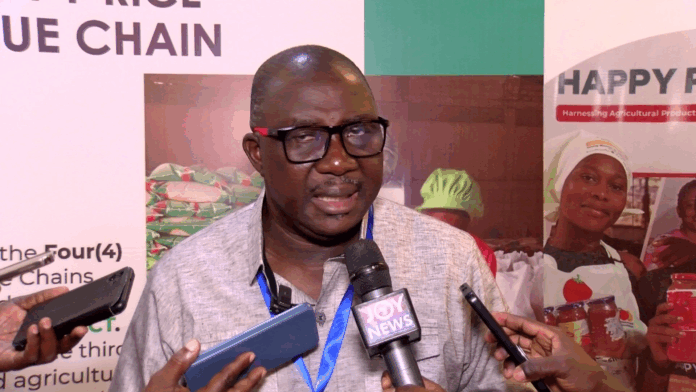Experts in Ghana’s agribusiness sector are intensifying calls for the government to remove withholding taxes imposed on agro-processing firms that source raw materials from local farmers.
Despite the government announcing a tax incentive for importation of agricultural products, the local manufacturing companies continue to pay at least 7% withholding taxes on materials obtained from local farmers.
The experts insist that the policy is not only counterproductive but also threatens the competitiveness of the sector.
At a recent stakeholder’ engagement held under the ‘Harnessing Agricultural Productivity and Prosperity for Youth’ (HAPPY) program, the experts warned that the existing tax regime discourages investment in local agriculture and undermines support for local farmers.
CEO of Agri-Impact, Daniel Faahene Acquaye, raised grave concerns about the disparity in taxation between local and imported raw materials.
According to him, while agro-processing firms are compelled to pay withholding tax when they purchase produce such as paddy rice from local rice growing communities, the same does not apply when they import similar raw materials.
“Why should agro-processing firms pay withholding tax when buying paddy rice from a smallholder farmer in Dambai or Bolgatanga? Meanwhile, when you import some of these raw materials into Ghana, you don’t pay withholding tax,” he questioned.
Mr. Fahene Acquaye argued that such policies discourage processors from patronizing Ghanaian farmers, ultimately weakening local production.
“We need to provide incentives and policies that will make our private sector competitive. Other countries are giving incentives, tax rebates, and waivers to support their producers. If we are not giving those waivers here, the least we can do is to exempt local raw material purchases from withholding tax,” he emphasized.
He explained that removing the tax would not only encourage firms to buy more from local farmers but would also reduce production costs for agro-processors.
This, he said, would translate into cheaper prices for consumers, creating a win-win situation for all actors in the agricultural value chain.
“The finished product on the market will also be cheaper, and consumers can buy more. That is important for us as a country. We need to change policy, we need to change practice, we need to change mindsets, and we need to change products,” he added.
The HAPPY program is supporting over 21 agri-SMEs in Ghana with catalytic funding, equipment financing, and technical support.
It has also trained more than 150 micro-entrepreneurs with business development skills and micro-grants.
Leaders of the initiative believe that such efforts will amount to little if taxation policies remain unfavorable to local sourcing.
Frank Obiora Mgbenema, a technical lead on the program, noted that agriculture is undergoing a transformation in Ghana, with youth and small enterprises showing growing interest and innovation in the sector.
However, he stressed that government support through policy reforms is indispensable.
“You can’t do anything in isolation without the government. One of the key areas is policy. Beyond land access challenges, which remain a cultural issue, tax policies also determine how far agribusiness can grow. We need to create an enabling environment for youth, women, and even persons with disabilities who are entering agriculture,” he said.
Source: Stephanie Frimpong


